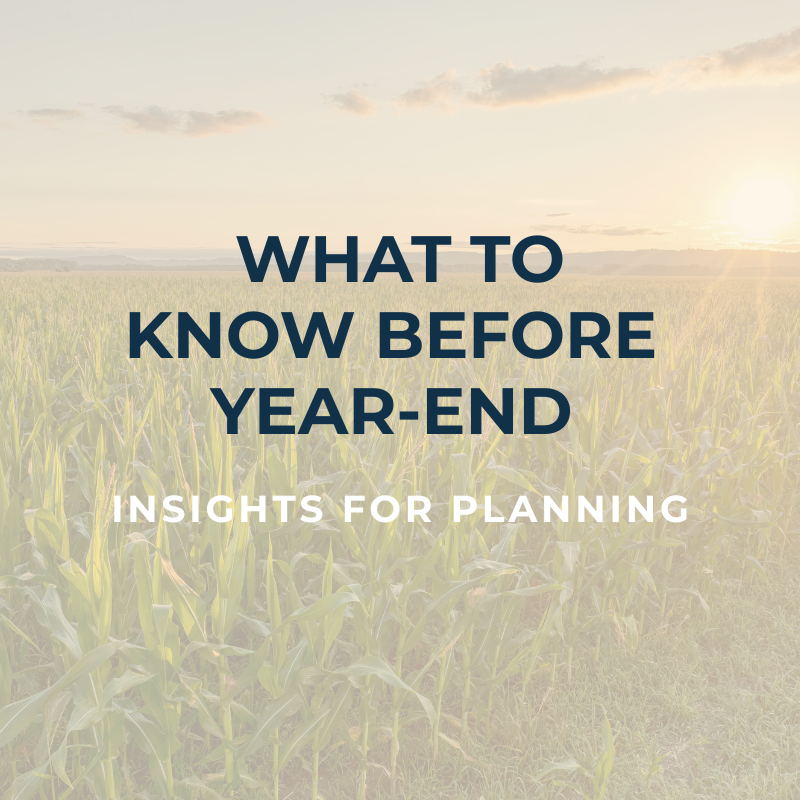In 1999, the Nebraska Legislature passed the Beginning Farmer Tax Credit Act. This Act allows asset owners to receive Nebraska state income tax credits in exchange for entering into a three-year rental agreement with beginning farmers. Rental assets include livestock, agricultural buildings, and farming equipment or machinery as long as they are used in the production of farming or livestock.
With the ever-increasing land prices and input costs to produce crops or livestock, it is important for beginning farmers and ranchers to be able to rent ground, machinery, or storage facilities for agriculture production to be profitable. The Beginning Farmer Tax Credit is a great resource for beginning farmers and ranchers as it offers tax credits to incentivize asset owners to rent their assets out to young farmers so they can get a fair shot at taking on the farming and ranching industry.

Written by,
Thomas Machal, EA
Senior Accountant, HBE LLP
What are the benefits?
As the beginning farmer, your benefits for this would be a three-year lease agreement instead of the typical year-to-year agreements. The beginning farmer could also receive up to a $500 tax credit for reimbursement of an approved financial management course. Finally, the farmer would be granted a Personal Property Tax Exemption for their first $100,000 of taxable value for 3 consecutive years.
As an asset owner, your benefits would include a refundable Nebraska income tax credit for each year of the minimum three-year lease. This credit can vary depending on the type of rent. Cash rent credit is 10% per year of the total cash rent to be collected over the 3 years. The credit for crop share or livestock rent is 15% of the owner’s share of the crop or livestock per year for 3 years.
Here are some examples:
- Cash Rent: $40,000 over three year lease x 10% = $4,000, the owner would get $4,000/year for three years for a total of $12,000.
- Share crop rent: 100 acres x 200 bushels per acre x 50% (owner’s share) = 10,000 bushels x $6.00 = $60,000 for owners share x 15% = $9,000 each year for three years for a total of $27,000
- Cow/calf share rent: 100 calves x 50% (owner’s share) = 50 calves x $1,000 (value of animal at time of division of calves) = $50,000 x 15% = $7,500 each year for three years for a total of $22,500.
Who is a Beginning Farmer?
It is important to understand that age (aside from being under 18) is not a factor when determining the eligibility of a beginning farmer. It simply means someone newer to the agricultural profession.
The following is a list of eligibility requirements that define a beginning farmer:
- The farmer must be a Nebraska resident and 18 years of age or older.
- Has farmed or ranched for less than 10 of the last 15 years.
- Has a net worth of no more than $750,000 (this can be adjusted for inflation).
- Will provide the majority of the day-to-day physical labor and management
- Plans to farm or ranch full-time
- Has farming/ranching experience or education
- Finally, has participated in an approved financial management course
Who is an Eligible Asset Owner?
- They must be an individual, trustee, partnership, corporation, LLC, or other business entity that has an ownership interest in the rented asset located within the state of Nebraska and is eligible to receive a Nebraska Tax Credit.
- They must agree to a minimum 3-year lease of the eligible asset.
Please note that close relatives (immediate and extended family) are eligible to receive the credit if the parties attend a training session on succession planning and the rental asset is included in a written succession plan. This means that current asset owners can pass on their current operations to their children or other members of their family and still be eligible for these credits.
How Do I Apply?
Once the beginning farmer has determined their and the asset owners’ eligibility to participate in the program, they will want to go to Next Gen Nebraska’s website and complete an application form. There are applications for both the beginning farmer and asset owner as well as an applicant checklist that will help make sure all the information needed for the application submission is ready to be attached to the application. Note that these credits are on a first come first serve basis, so it is important to apply as early as possible so the funds do not run out. It is also important to note that farmers can apply for the course reimbursement credit and/or the personal property tax exemption separately even without renting from an asset owner.
The due dates for the applications are as follows:
- Tax Credit: November 1st of the year for which tax credit is sought.
- Financial Management Course Reimbursement: November 1st of the year cost is incurred.
- Personal Property Tax Exemption: November 1st of the year preceding the year for which exemptions are sought.
Overall, Nebraska’s Beginning Farmers Tax Credit is advertised as a “win-win-win” for the asset owner and beginning farmer and Nebraska. The asset owners are getting tax credits to lease their property to beginning farms allowing the beginning farmers to grow their operations while also keeping the agriculture industry strong in the state. If you or someone you know would think they are eligible, visit the NExt Gen website at https://nextgen.nebraska.gov/. There, you will find a downloadable brochure, resources for any level of farmer on a variety of topics, links to monthly workshops, and much more.
If you have any questions about the beginning farmer tax credit program, your HBE trusted advisor is here to assist you.




